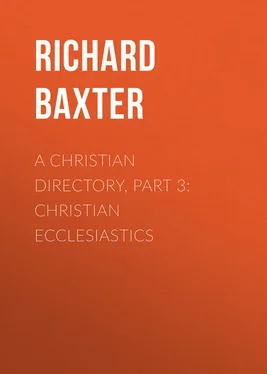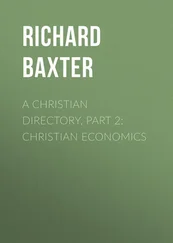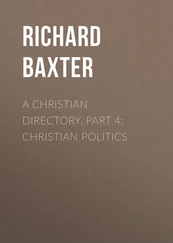Richard Baxter - A Christian Directory, Part 3 - Christian Ecclesiastics
Здесь есть возможность читать онлайн «Richard Baxter - A Christian Directory, Part 3 - Christian Ecclesiastics» — ознакомительный отрывок электронной книги совершенно бесплатно, а после прочтения отрывка купить полную версию. В некоторых случаях можно слушать аудио, скачать через торрент в формате fb2 и присутствует краткое содержание. Жанр: foreign_antique, foreign_prose, на английском языке. Описание произведения, (предисловие) а так же отзывы посетителей доступны на портале библиотеки ЛибКат.
- Название:A Christian Directory, Part 3: Christian Ecclesiastics
- Автор:
- Жанр:
- Год:неизвестен
- ISBN:нет данных
- Рейтинг книги:3 / 5. Голосов: 1
-
Избранное:Добавить в избранное
- Отзывы:
-
Ваша оценка:
- 60
- 1
- 2
- 3
- 4
- 5
A Christian Directory, Part 3: Christian Ecclesiastics: краткое содержание, описание и аннотация
Предлагаем к чтению аннотацию, описание, краткое содержание или предисловие (зависит от того, что написал сам автор книги «A Christian Directory, Part 3: Christian Ecclesiastics»). Если вы не нашли необходимую информацию о книге — напишите в комментариях, мы постараемся отыскать её.
A Christian Directory, Part 3: Christian Ecclesiastics — читать онлайн ознакомительный отрывок
Ниже представлен текст книги, разбитый по страницам. Система сохранения места последней прочитанной страницы, позволяет с удобством читать онлайн бесплатно книгу «A Christian Directory, Part 3: Christian Ecclesiastics», без необходимости каждый раз заново искать на чём Вы остановились. Поставьте закладку, и сможете в любой момент перейти на страницу, на которой закончили чтение.
Интервал:
Закладка:
Direct. XXI. In controversies which depend most upon skill in the languages, philosophy, or other parts of common learning, prefer the judgment of a few that are the most learned in those matters, before the judgment of the most ancient, or the most godly, or of the greatest numbers, even whole churches, that are unlearned. In this case neither numbers, nor antiquity, nor godliness will serve turn: but as one clear eye will see further than ten thousand that are purblind, so one Jerom or Origen may judge better of a translation, or the grammatical sense of a text, than a hundred of the other fathers could. One man that understandeth a language is fitter to judge of it, than a whole nation that understand it not. One philosopher is fitter to judge of a philosophical question, than a thousand illiterate persons. Every man is most to be regarded in the matters which he is best acquainted with.
Direct. XXII. In controversies of great difficulty, where divines themselves are disagreed, and a clear and piercing wit is necessary, regard more the judgment of a few acute, judicious, well-studied divines, that are well versed in those controversies, than of a multitude of dull and common wits that think to carry it by the reputation of their number. It is too certainly attested by experience, that judicious men are very few, and that the multitude of the injudicious that have not wit enough to understand them, nor humility enough to confess it, and to learn of them, have yet pride and arrogancy enough to contradict them, and often malice enough to vilify them. In such differences it is not only a sign of a wise man to be content with the approbation of a few, but also to have but few approvers (except where the injudicious do implicitly believe those few that are judicious). Commonly a very few that are wiser than the multitude, are fain to stand by, and compassionate not only the world but the church, and see the disease, and the easy remedy, and all in vain; while they are but neglected or despised by the rest, that will not be made wiser by them.
Direct. XXIII. In all contentions hold close to that which all sides are agreed in; there is so much agreed on, even between the papists and the protestants, as would certainly save them all, if all of them did sincerely believe, love, and practise it; for they all confess that the whole canonical Scripture is true. Therefore be more studious sincerely to hold and improve those common truths which they all profess, than to oppose the particular opinions of any, further than that common truth requireth it. See that the articles of the common creed which all profess, be unfeignedly believed by you; and that the petitions in the Lord's prayer be sincerely and earnestly put up to God; and that the ten commandments be heartily and entirely obeyed; and then no error or difference will be damning to you.
Конец ознакомительного фрагмента.
Текст предоставлен ООО «ЛитРес».
Прочитайте эту книгу целиком, купив полную легальную версию на ЛитРес.
Безопасно оплатить книгу можно банковской картой Visa, MasterCard, Maestro, со счета мобильного телефона, с платежного терминала, в салоне МТС или Связной, через PayPal, WebMoney, Яндекс.Деньги, QIWI Кошелек, бонусными картами или другим удобным Вам способом.
1
Qui totos dies precabantur et immolabant, ut sui liberi sibi superstites essent, superstitiosi sunt appellati, quod nomen patuit postea latius. Qui autem omnia, quæ ad cultum Deorum pertinerent, diligenter retractarent, et tanquam relegerent, sunt dicti religiosi, ex relegendo; ut elegantes ex eligendo, a diligendo diligentes, ex intelligendo intelligentes. Superstitiosi et religiosi, alterum vitii nomen, alterum laudis. Cicer. Nat. Deor. lib. ii. pag. 73, 74.
2
If they that serve their God with mere words, and ceremony, and mimical actions, were so served themselves, they might be silenced with Aristippus's defence of his gallantry and sumptuous fare, Si vituperandum, ait, hoc esset, in celebritatibus deorum profecto non fieret. Laert. in Aristip. So Plato allowed drunkenness only in the feasts of Bacchus.
3
Read Mr. Herbert's Poem called "Providence."
4
Psal. xlv. 11; lxvi. 4; lxxxvi. 9; xcv. 6; xcix. 5.
5
Heb. viii. 3.
6
Heb. vii. 27, 28; ix. 26, 28; x. 19-22, 13, 24; vi. 20; vii. 25, 26; Matt. xvii. 5; John xi. 42.
7
Luke xx. 36; see Eccl. v. 5; Psal. cxxxviii. 1; Isa. vi. 2.
8
See Mr. Ambrose's book of Communion with Angels; and Zanchy on the same subject: and Mr. Lawrence's and Dr. Hammond's Annotat. on 1 Cor. xii.
9
Adulterium est, impium est, sacrilegium est, quodcunque humano furore instituitur, ut dispositio Divina violetur. Cyprian. Eccl. v. 1, 2; Lev. x. 1-3; Rom. x. 2, 3.
10
1 Thess. ii. 4; Col. i. 10; John viii. 29; 1 Cor. vii. 32; Heb. xi. 6; 1 John iii. 22.
11
Psal. xlii.; lxxxiv.
12
2 Tim. iii. 5; 1 Tim. iv. 7.
13
Isa. xxix. 13; Matt. xv. 8; xi. 23, 24; 2 Sam. xv. 25, 28, 29.
14
Luke x. 42.
15
2 Chron. i. 10-12.
16
Eph. vi. 18; Luke xxi. 36; Rev. iii. 3; Col. iv. 2; Matt. xiii. 33-37.
17
Jude 19.
18
Read on this subject a small book which I have written, called "Catholic Unity."
19
See Rom. xiv. xv; 1 Cor. viii. 13.
20
Lev. xix. 2; xx. 7; 1 Pet. i. 16.
21
The second commandment. Cicero de Nat. Deor. lib. i. p. 46, saith, that Possidonius believed that Epicurus thought there was no God, but put a scorn upon him by describing him like a man, idle, careless, &c. which he would not have done if he had thought there was a God.
22
Matt. xv. 2, 3, 6; Mark vii. 3-14; Col. ii. 8, 18, 22.
23
But with the barbarous it is otherwise, saith Acosta the Jesuit, p. 249. l. 2. Proderit quam plurimum ritus et signa et omnem externum cultum diligenter curare. His quippe et delectantur et detinentur homines animales (N. B.) donec paulatim aboleatur memoria et gustus præteritorum. So Gr. Nyssen saith in vita Gr. Neocœs. that they turned the pagans' festivals into festivals for the martyrs, to please them the better. Which Beda and many others relate of the practice of those times.
24
Rom. iii. 7.
25
Read Plutarch of Superstition.
26
Isa. ii. 3; i. 10; xlii. 4; Mic. iv. 2; Heb iii. 2, 3, 5; x. 28: Acts vii. 37, 38; iii. 23; Psal. xix. 7; Isa. v. 24.
27
Rom. xiii. 9; Matt. xxii. 37; Isa. viii. 16, 20; Acts viii. 25; xv. 35, 36; xxvi. 17, 18; 1 John i. 9; Neh. i. 6; Lev. xvi. 21; Phil. iv. 6; Psal. l. 14; lxix. 30; c. 1, 2, 4; Eph. v. 19; Psal. ix. 11; xcv. 1; Luke xi. 2, 3, &c.; Matt. xxviii. 19; 1 Cor. xi. 23-26, 28; xiv. 5, 12, 26; 2 Cor. x. 8; xiii. 10; Rom. xv. 2; 1 Cor. xiv. 40; Rom. xiv. 15, 20; 1 Cor. ix. 20-22; viii. 10; x. 19, 28; 2 Cor. vi. 16.
Читать дальшеИнтервал:
Закладка:
Похожие книги на «A Christian Directory, Part 3: Christian Ecclesiastics»
Представляем Вашему вниманию похожие книги на «A Christian Directory, Part 3: Christian Ecclesiastics» списком для выбора. Мы отобрали схожую по названию и смыслу литературу в надежде предоставить читателям больше вариантов отыскать новые, интересные, ещё непрочитанные произведения.
Обсуждение, отзывы о книге «A Christian Directory, Part 3: Christian Ecclesiastics» и просто собственные мнения читателей. Оставьте ваши комментарии, напишите, что Вы думаете о произведении, его смысле или главных героях. Укажите что конкретно понравилось, а что нет, и почему Вы так считаете.












